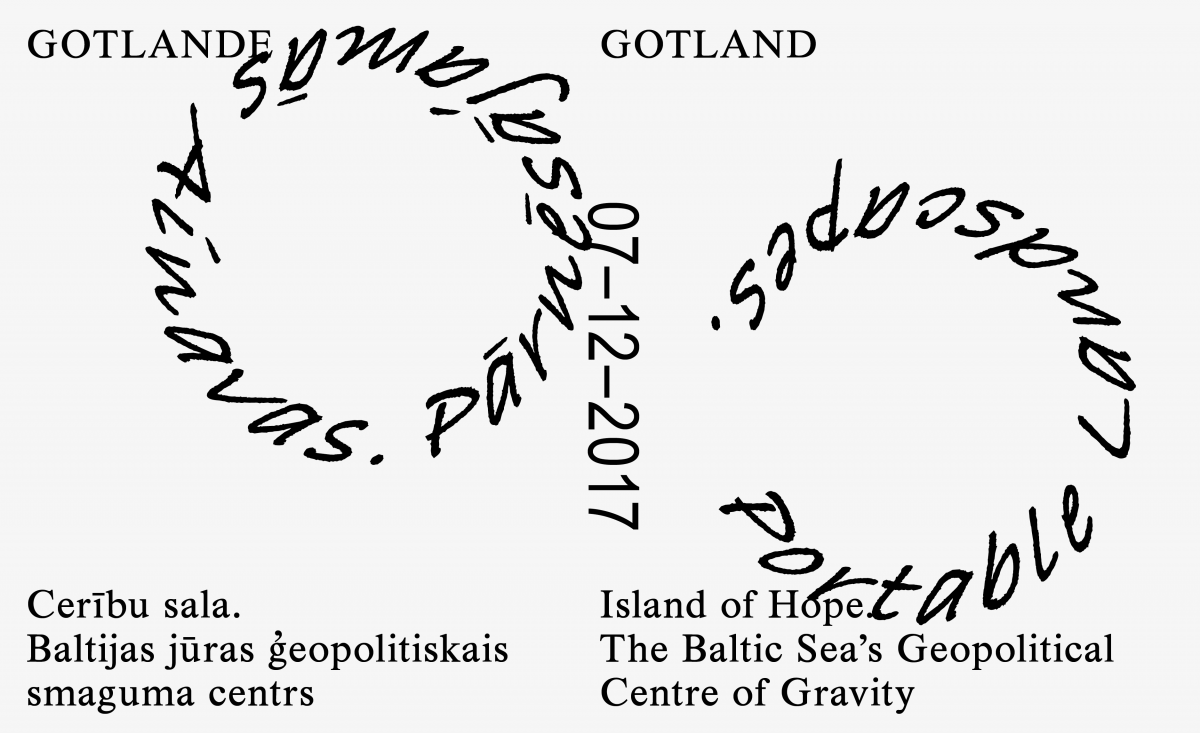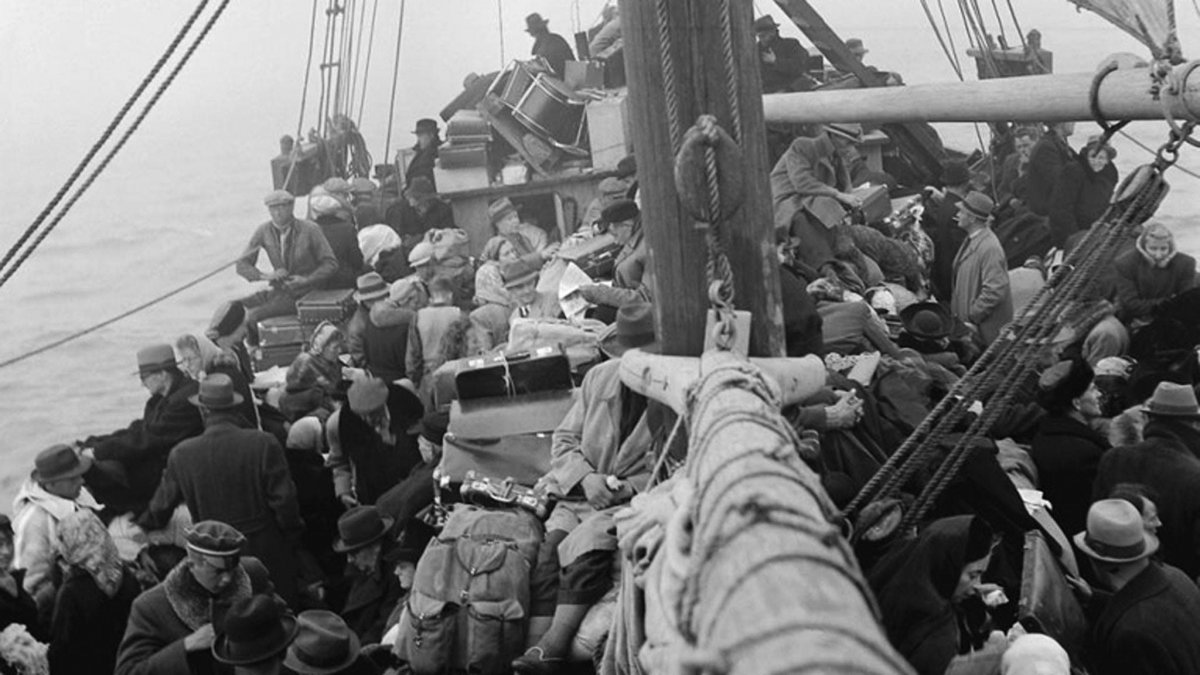

On Thursday, 7 December at 18:00, the Latvian Centre for Contemporary Art invites you to the third discussion from the international contemporary art project PORTABLE LANDSCAPES: Island of Hope. Gotland – The Baltic Sea's Geopolitical Centre of Gravity. Its participants are curators at the Latvian Centre for Contemporary Art Solvita Krese and Diāna Popova, Senior Academic Librarian at the National Library of Sweden Jānis Krēsliņš, Artistic Director of the Baltic Art Center Helena Selder and Swedish artist Ingela Johansson.
Portable Landscapes is an international contemporary art project with exhibitions in Riga, Paris, New York, Sweden and Berlin, which traces the manifestations of Latvian art in exile and emigration from the beginning of the 20th century until today. Broadening the context of art events in each of the selected geographical points, these are introduced by discussion workshops where art researchers from Latvia and abroad are invited to participate.
The third discussion of the cycle is devoted to Gotland, which has long been an important point in the geopolitical map of the Baltic Sea region. The island's isolation and at the same time location on the intersection of various strategic routes has over the course of centuries contributed to its formation into an active centre of trade, a significant bastion of defence as well as the locus of important political activities. Following World War II, Gotland became the Baltic Sea's geopolitical centre of gravity, marking the borders set by the Cold War's Iron Curtain which separated the territories subjugated by Soviet ideology from the rest of the world. During the years of occupation of the Baltic states, Gotland remained an island of hope, the nearest outline of the world outside, yet Soviet citizens were taught to forget about the existence of the other shore of the sea. Also in recent years, seeing the provocative military activity in the Baltic Sea and heightened tension in the political map of the world, it is no coincidence that Gotland's strategic importance again is on the rise.
In autumn 1944, thousands of Baltic citizens were faced with an unenviable choice – either to wait for the victory of the Soviet regime and be dragged into the whirlpool of repression or to set out on the dramatic flight in overcrowded boats across the Baltic Sea. Seeing promise in Sweden's proximity and declared neutrality in this clash of superpowers, around 4500 Latvians reached the shores of Sweden with the hope of returning home after a swift defeat of Soviet power. Unfortunately, the return to an independent Latvia did not materialise, and opportunities for a new continuation of life in Sweden had to be sought, attempting to integrate into local society and at the same time recognising and fighting the feeling of unbelonging.
Similar processes affected the populations of Estonia and Lithuania, with 26 000 Estonians and several hundreds of Lithuanians setting off across the sea in desperation. All Baltic refugee communities established their organisations and gathered around members of political elite and intellectuals in exile, in defiance of the fate that had befallen them following World War II.
The third discussion will turn to the specific role of Gotland in the Baltic Sea region and its significance in the history of Baltic nations. Curators at the Latvian Centre for Contemporary Art Solvita Krese and Diāna Popova, will talk about the work of artists represented in the Swedish part of the exhibition Portable Landscapes, Senior Academic Librarian at the Library of Sweden Jānis Krēsliņš will present his reading “Cast in a New Light: The Exile Experience and the Aesthetics of a Newfound Creativity", Artistic Director of the Baltic Art Center in Visby, Helena Selder will speak about the influence of historical events on the establishment of the centre in the 1990s, with it becoming the point of contact between Western and Eastern cultures in Gotland, while Swedish artist Ingela Johansson will present her project on the artistic and political activities of Lithuanian artist Eugenius Budrys in Gotland on the path to the restoration of independence of Lithuania.
Program:
18.00 Solvita Krese un Diāna Popova - Introduction
18.30 Jānis Krēsliņš - Cast in a New Light: The Exile Experience and the Aesthetics of a Newfound Creativity
19.00 Helena Selder - Gotland and the Baltic Art Center - a Crossroad for Art and Exile
19.30 Ingela Johansson - The Nearest Point to the Free World
Participants:
Jānis Krēsliņš is Senior Academic Librarian at the National Library of Sweden. He was born in New York in the family of Latvian historian Jānis Krēsliņš and his wife Skaidrīte. He studied at the private Riverdale Country School in New York and Haverford College in Pennsylvania. He studied at Harvard University and Boston College. In 1982 he earned a Fulbright scholarship for studies in Sweden and in 1989 Stockholm University awarded him a PhD. In National Library of Sweden (Kungliga Biblioteket) he oversees early collections.
Ingela Johansson lives and works in Stockholm. Johansson’s research-based artistic practice often responds to site-specific issues with an interest in social history and collective memory. Her interdisciplinary approach combines various aesthetic strategies and media to create an engaging body of work. She was part of the Kirunatopia project presented at Bildmuseet, Umeå (2012) and Kunsthaus Dresden (2014). Her book project “The Art of the Strike”, voices on cultural and political work during and after the mining strike in the north of Sweden in 1969–70 (Glänta, 2013). Her most recent exhibitions and projects includes: Latvian Contempoarary Art Center, Riga (2018), Kunsthalle Trondheim, Norway (2017), Alternativa, Gdansk (2016), Kalmar Konstmuseum, Sweden (2015), Die Ästhetik des Widerstands, Galerie im Turm, Berlin (2014), Tensta Konsthall, Stockholm (2013).
Diāna Popova is an art and culture event organizer and curator, working at the Latvian Centre for Contemporary Art since 2014. She has been the project manager and co-curator or the cycle of exhibitions “Divdabis” (2017) at the Latvian National Museum of Art, program director and co-curator of the Year of Hardijs Lediņš (2015), project manager in the contemporary art festival SURVIVAL KIT since 2014, program manager of the LCCA Office gallery (2014-2016). In 2017 she has been a guest curator at the gallery Gedok München, Germany where she organized exhibition “Monocular Spectator. Performance for the camera”.
Helena Selder studied art history at the Stockholm University and holds an MA in Curating Contemporary Art from the Royal College of Art in London. Since 2016 she is the artistic director of Baltic Art Center on Gotland, Sweden. Selder was part of setting up Marabouparken konsthall, a contemporary art space in Sundbyberg, where she also curated Marabouparken Lab’s public art programme. She’s been the editor and author of several publications: Marabouparken – konst, landskap och arkitektur (Marabouparken – Art, Landscape and Architecture, 2005), Varför blev du konstnär? (Why Did You Become an Artist?, 2010), Parkliv (Park Life, 2010), Uglycute (2012). Currently she is collaborating with Akademi Valand on Public Enquiries, a monograph on the artistic practice of Swedish artist Kerstin Bergendal.
Solvita Krese is a curator and since 2000 director of the Latvian Centre for Contemporary Art. She has been curator of number of large scale international exhibitions, most recent ones are Identity: Behind the Curtain of Uncertainty, National Gallery of Ukraine, Kiev (2016), Re: visited, Riga Art Space (2014), Alternativa, Gdansk (2013). She was commissioner of the Latvian Pavilion in Venice Biennale (2015). In 2009 she initiated the annual Contemporary Art Festival SURVIVAL KIT which she has been curating since then.
Portable Landscapes that take place within the program of the Latvia’s Centenary, will examine the stories of exiled and emigré Latvian artists, locating them within the broader context of 20th-century art history, and wider processes of migration and globalization.
Portable Landscapes is supported by Latvian Culture ministry, State Culture Capital foundation, Embassy of US, Embassy of Canada, The Goethe Institute in Riga.
Portable Landscapes is made possible with the generous support of the Ministry of Culture of the Republic of Latvia, State Culture Capital Foundation, and Embassy of Canada to Latvia and the Goethe-Institut in Riga. Latvia’s Centenary celebrations take place from 2017 to 2021. The central message of the centenary celebrations is “I am Latvia” emphasizing that the main value of Latvia is its people that create its present with their everyday work and build the basis for its future together with the new generation. The project of the LCCA Portable Landscapes is one of the events of the Latvia’s Centenary Celebrations.